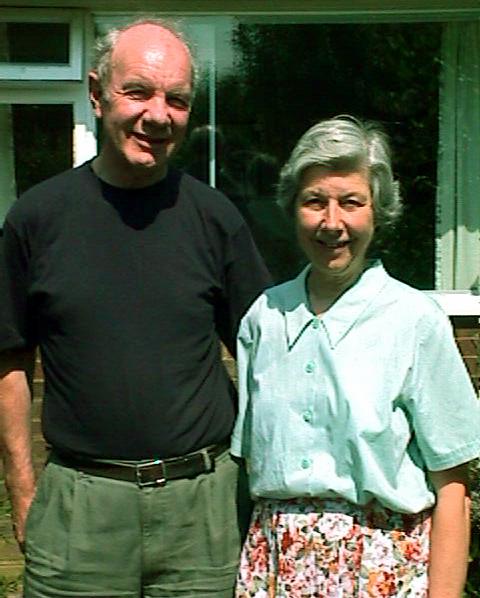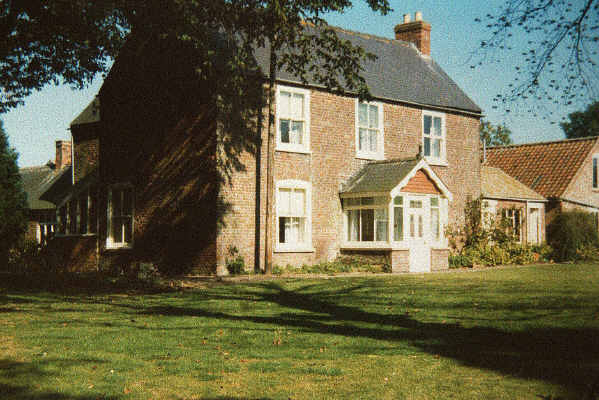|
|
|
|
Written by Roy Walker John Gilliat (1792-1867), The Fourth son of Richard, was destined to a much more modest, if totally respectable, future. On March the 19th 1816, at the age of 23 he married Susanah Abraham (1792-1878) of Thorpe St. Peter, where he subsequently settled in the Old Hall Farm. They had four sons and six daughters, most of whom married locally. Even today Thorpe St. Peters is a scattered village, lying about two miles from Wainfleet on the road to Spilsby, and no doubt it does not look much different from what it did a hundred years ago or more. In the decade from 1811 to 1821, during which period John Gilliat arrived there, the population had doubled from 196 to 381, and the rise continued steadily till it reached its peak at 649 in 1871. After that a decline in population set in and as agriculture became depressed, among those to leave the village community were John's son Alfred (1824-1903) who having lost money in a horse breading venture, left his wife Hannah Simpson (1832-1920) and home to seek fresh pastures. Success remained elusive, and some twenty years later, in 1903, he died alone in a Southwell workhouse in neighbouring Nottinghamshire. Earlier in the nineteenth century the place must have seemed attractive to the farmer and the grazier. It was an extensive Parish, only a mile in width, but stretching seven miles from east to west and containing some 2880 acres, including good marshland and a large allotment of the East Fen, good grazing country. A few houses clustered together, but most farms and cottages were well dispersed. The church, sandstone built in the decorated style was the oldest building with an early Jacobean pulpit. Nearby stood Thorpe Hall, built around 1800, evidently on the site of an older medieval building, as traces of a moat remained. The local people claimed that Dick Turpin had once slept there. Further along the road stood the Old Hall Farm, home of the Gilliat's, a brick built house with a stone bearing the date 1657. Alfred was not the first to desert his family and the Lincolnshire countryside. His second son Joseph (1856 - 1929) had decided some ten years previously in 1874 at the age of 18 that farming was not for him. He duly ran away to London where he found a job on the railways, supplementing his income by dealing with Jewish traders, as a result of which he developed a sideline in buying and selling watches. Five years later he met and married Sarah Eliza Brett from Suffolk, then a lady's maid to Lady Mount Morris. Joseph's mother never approved of the match and felt he had married beneath himself. Such was the Victorian way of things. He seldom returned to Lincolnshire to visit her. Three children were born and then suddenly Joseph was transferred to a country station at a tiny village of Heather in Leicestershire. The reason for the move remains obscure. Some say that he had throat trouble from the sulphur fumes of a city station; others that his drinking habits became so excessive that his superiors considered a quieter location very desirable. The family moved into a three hundred year old house, called Pump Cottage because it once boasted its own well and water supply. Now however, the well stood dry, and water had to be carried from the village well. The cottage was also next to the Queen's Head, which at times was to prove a trifle too convenient. The rent was two shillings a week, plus sixpence for the use of a large garden. There were three bedrooms and a large sitting room with a spacious baker's oven next to the open fire, where Sarah baked her own bread. Water was heated in a big pot above the kitchen fire. Flagstones covered the floor. Such were the blessings of so called domestic bliss. However there were compensations, garden produce was transformed into home made jams and pickles; eight small kegs were replenished annually with rhubarb and elderberry wine. The local farmer killed his own beast and delivered the meat fresh to the door, likewise with milk. There was a pig sty in the garden, and a flitch of bacon would always be hanging in the house. Chickens were kept for a constant supply of fresh eggs. Joseph would also obtain permission in season to fish for trout on the squire's estate, and when deer was hunted they were sometimes the recipients of a good piece of venison. Emphasis still lay very much on the notion of self-sufficiency. Despite a healthy diet life remained precarious. In 1890 there was a scarlet fever epidemic at Heather which resulted in the death of several children, including the two eldest Gilliat offspring. Ernest Joseph (1888-1972) and his sister Ethel Ruth survived. They were dispatched to the village school before they could hardly toddle. Their father was particularly keen that they should learn. Joseph himself had received a sound basic education and, unlike many of his contemporaries was able to read and write. People came in from the village to ask him to read their letters to them and pen a reply. Such a one was Little Nell, barely four and a half feet tall and always in a long black dress and apron. She always brought the penny stamp for the postage plus a penny coin for the services rendered, but the latter was always politely, but firmly, refused. Few of the Gilliat relatives from Lincolnshire ever visited. Joseph did have a much younger brother called Robert (1877-1949) who once paid a call at the tiny cottage. After their father had fallen on hard times Robert had to rely very much on his own resources to make a living. At seventeen he worked on a Poultry farm at Woodhall Spa, then drove steam lorries for the removal firm of Proctor's, his marriage certificate described him as an `engine driver'. In 1916 the family moved to Mansfield where Robert became the first to drive a lorry for the brewery. He called it Amy after Amy Johnson who made her famous flight to Australia. He had three sons from whom are descended many others by the name of Gilliat. A number worked either for Mansfield Brewery or Clipston Colliery. Joseph's children Ernest and Ethel were educated in strict disciplined fashion at Heather National School. On weekdays they were expected to be in line in the school playground by 8.50 a.m. ready for inspection of shoes, hands, etc. by the headmaster. After prayers and a hymn lessons would begin, Scripture, Singing, Arithmetic, Spelling and so on. On Friday afternoon, as the children proceeded out of the building, a final admonishment would be delivered by the headmaster; "Tomorrow is Saturday. See that you help your parents in any way they wish. Give them your full respect, and remember the Commandments. Sunday school at 9.30 a.m." And so it was: Saturday was the day when chores were done, sweep the yard and the paths, clean out the chickens, fetch the water, and so on, then church on Sunday mornings, and if they were really lucky, an afternoon walk down the country lanes with dad. The weekly routine was broken only by annual traditional events such as the Wakes in June, which consisted mainly of a few swinging boats and a coconut shy, or Maypole Day, when the children dressed up in ribbons and sang "Spare a penny for the Maypole", or Molly dancing at Christmas, when they toured the village dressed in anything they could find and blackened their faces. Sometimes there was an unexpected surprise as when Farmer Poynton's cow slipped her halter at the slaughterhouse door and sensing something both momentous and disagreeable was about to happen, cantered down the village street as fast as her bovine limbs would carry her. At last in some desperation, she turned in at some open cottage door, hoping to find refuge, and in her confusion devastated all the best china displayed on the dresser before making an even more turbulent exit to the rear. Ernest Gilliat left school in 1900 at the age of 12. Prospects were limited to the farm, the coalmine, or the brickworks. He seemed not to have inherited any of his ancestors longing for new pastures, was to young to go underground, so chose to don a little leather apron and carry bricks from the kiln to the rail truck. The first year he worked from 6 a.m. till 3 p.m. the second two hours longer. He earned 2 shillings and 6 pence a week, of which he was allowed to retain 10% as pocket money. Two years later he changed jobs, seeking employment at the pit where he could earn four times as much. By the age of twenty he was married. By 1926 he had six growing children and no work for six months once the General Strike was called. He and his fellow miners would visit the old Heather coal mine and dig sacks of coal from the surface. The children had to seek employment in the Leicester factories as soon as they could leave school. Thus Grace Gilliat became a factory girl at the age of fourteen, but not for long. As soon as the miners were back at work she was required to stay at home to perform the duties of a house wife in lieu of an increasingly invalid mother. Thus Grace did not marry till her late twenties and the first years of her marriage were accompanied by the unwelcome events of far reaching consequences; the outbreak of a war that threatened to take her husband away from her; the death of her mother, which left her with the additional responsibility of a widowed father to look after; and the birth of her first son. That was me (Roy Walker), perhaps to prove the most unwelcome challenge of all! |
|
 |
Roy Walker info |
| Roy & Margaret Walker info |
 |
2002.jpg) |
Elizabeth Grace Finnegan Daughter of Roy & Margaret Walker |
|
Home Of John Gilliat 1792-1867 Old Hall Farm, Thorpe St Peter |
 |
|
|
images info. |
|
images info |
|
|
|
image info. |